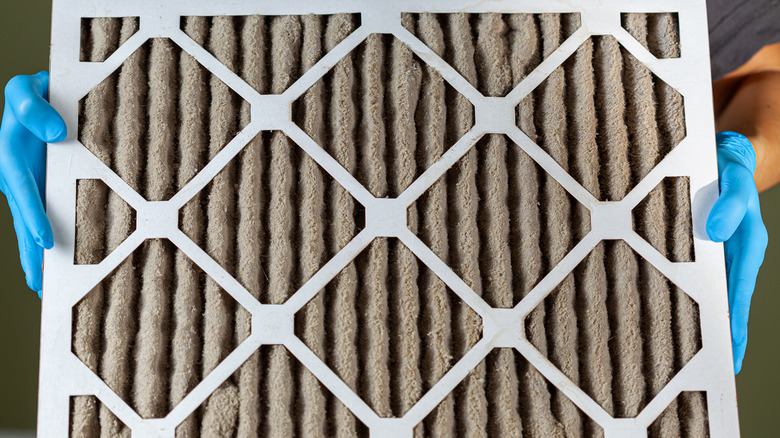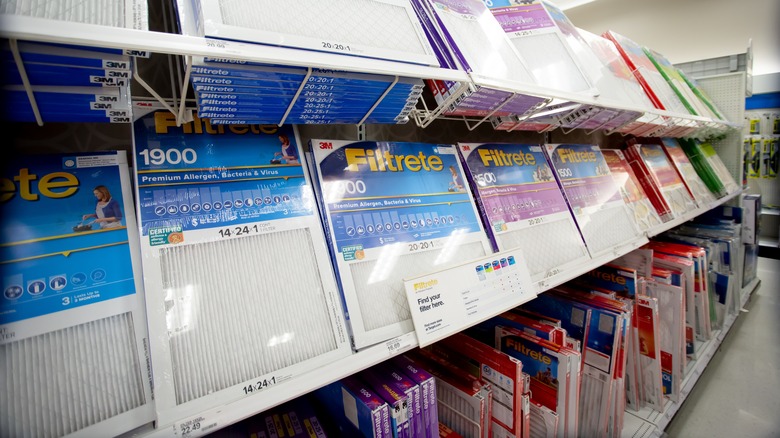Home Depot's HDX Air Filters Vs. Name Brands: How Does It Compare?
Has it been months since you last changed out your air filter? While seemingly an inconvenience to keep up with, they're essential for maintaining a working HVAC system and a healthy home. In fact, indoor air pollution from smoke, soot, and chemicals can be a serious threat to human health, with negative effects ranging from sore throats and fatigue to respiratory disease and cancer (via U.S. Environmental Protection Agency). According to Berkeley Lab, air filters can significantly reduce the amount of these and other harmful airborne particles in your home, including allergens, mold and fungal spores, bacteria, and even viruses.
While on the hunt for an inexpensive air filter, make sure to get the best bang for your buck. Popular HVAC filter brands like Filtrete, Aprilaire, and Honeywell are go-to options for many concerned homeowners, but their reputation comes with a price. Home Depot's generic HDX filters purportedly offer greater affordability, but how does HDX compare with other well-known brands? Are HDX filters just as good as the name brands, or is it worth spending more to have better air quality? In this article, we'll dissect HDX air filters so you can make an informed decision.
Breaking down Home Depot's HDX filters
MERVs, which stand for minimum efficiency reporting values, are the typical industry standard for rating air filters. A name brand filter's MERV rating will generally fall between 1-16, with HEPA filters capturing approximately 99.9% of particles (via U.S. Environmental Protection Agency). For most commercial buildings and residential homes, Berkeley Lab recommends filters with a MERV rating between 8 and 13. Unless you live near a busy highway or in an area with frequent forest fires, a higher MERV rating likely isn't necessary for your home.
Unfortunately, Home Depot's HDX filters don't comply with the standard MERV rating system and instead use FPR, or filter performance rating. Moreover, there are no industry standards or regulations for the retailer's FPR system. In fact, this rating system is used exclusively by Home Depot for its HDX products. HDX's 1-inch air filter has an FPR rating of 10, which claims to last up to 90 days.
Additionally, Home Depot doesn't provide a clear translation between FPR and MERV, stating online that an FPR 10 product falls somewhere between 8 and 13 MERVs. Even if HDX's "premium allergen" FPR 10 filter ranked at 13 MERVs, it wouldn't be as efficient for reducing allergens in your home compared to an actual MERV 16 or HEPA filter. Ultimately, this vague rating system makes it difficult for consumers to determine specific product quality compared to name brands.
HDX vs. the leading name brand
Now, if you're looking to cut home maintenance costs and aren't concerned about pollutants or allergens in your area, Home Depot's HDX filters are certainly better than nothing. Consumer reviews are quite positive for the HDX brand filters, with 96% of buyers saying they would recommend the product. While they may not have a consistent MERV rating, HDX filters are designed similarly to other brands like Filtrete, with wire-backed pleats and electrostatically charged media. Overall, HDX's filters aren't a bad choice, but they may not be ideal for households with sensitive or allergy-prone family members.
When it comes to choosing the best quality air filter, Filtrete's options may be slightly better suited for protecting you and your family. According to tests run by Consumer Reports, Filtrete filters consistently rank high for removing dust, pollen, smoke, and more. Home Depot's HDX filters did not make the rankings. Filtrete's 1-inch air filters are nearly the same price as Home Depot's HDX filters; roughly $20 per filter. However, consumers will have additional peace of mind with Filtrete's standardized MERV rating. Like Home Depot's HDX filters, Filtrete recommends changing out filters about four times per year, or roughly every 90 days, so annual costs are comparable.


